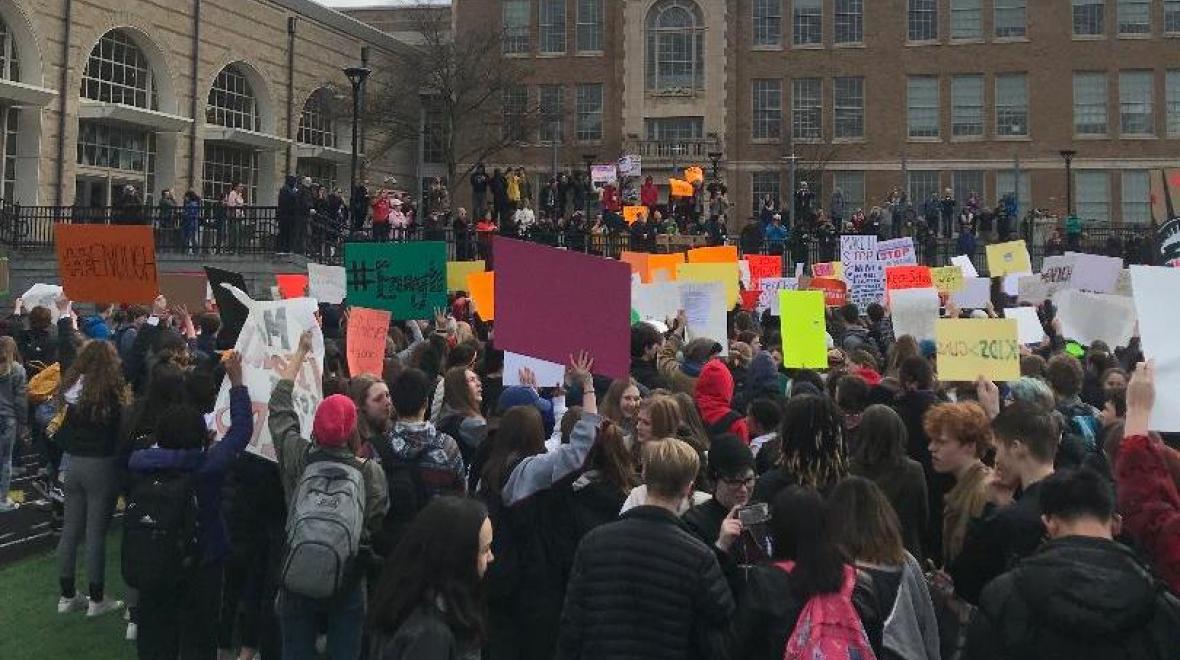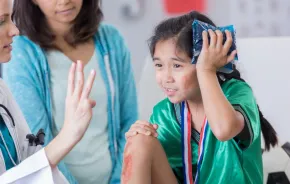
Photo:
High school students filled Red Square for the March 14 student walkout. Photo credit: Tanya Thackeray Wilson
Teens can be inspiring in spectacular ways when they become impassioned about a cause. Widespread awe among adults was registered when articulate and brave teens from Marjory Stoneman Douglas High School confronted lawmakers about their responsibility to prevent gun violence.
Within four days of the school shooting on their campus, #NeverAgain was created. In the midst of their grief and trauma, survivors mobilized thousands of teens who protested in front of courthouses in Florida. The movement is gaining momentum. On March 14, thousands of teens across the nation led school walkouts, an unprecedented show of unity and call to action against gun violence. On March 24, teens are organizing March for our Lives, a march in D.C., with sibling marches across the nation, to commemorate the 19th anniversary of the Columbine tragedy.
Research has established that a good way to counteract hopelessness and helplessness after trauma is to find meaningful ways to become helpers. Other recent upticks in activism among teens have occurred with #BlackLivesMatter, #MeToo, and #MyClimateAction. The common theme is that they are shaping their identities around taking political action.
Political questioning has always been one of the ways teens define their unique identities, along with examinations of religious, sexual, educational and future career values. Risk-taking during adolescence is built into their DNA as they explore exciting new opportunities and experiences.
Youth getting fired up about injustices — be they about their parents’ rules or the government’s — has been going on since time immemorial.
Teen political action can help them meet their developmental needs in positive ways. Teens are driven to be connected, important, included and recognized for special contributions. It’s gratifying for them to be a part of something new, edgy and opposed to the dominant paradigm. As teens face feelings of vulnerability related to school safety, economic anxiety, climate change, and other world problems, it can feel good to be engaged and enraged about the world they are inheriting.
Teens need and deserve more acknowledgment for their humanity.
It can also be exhilarating to find valid fault with societal structures that adults have maintained or protected. Although teens get criticized regularly for their own behaviors related to substances, media and materialism, they have the moral high ground when they hold adults accountable for current social and political problems. Why wouldn’t they be angry about violence, racism, sexism, and the destruction of nature as we know it?
Feeling righteous and impassioned about politics can feel sublime as a teen. Dopamine, the neurochemical released with pleasurable experiences, can be dumped out in the brain as plentifully during an enthralling political rally as an experience with sex, drugs or a chocolate sundae. Oxytocin has been associated with the "helper's high" because solidarity and kinship with others is heart-warming — literally. Youth are often the ones on the front lines of protests fighting for rights, like the ones first attending desegregated schools. Political activism for teens is rewarding on many levels. For a TEDx talk I gave last year, I chose the topic, “Teens deserve more credit for their humanity.” #NeverAgain (and now #Enough, which may surpass #NeverAgain) sprouted from tragedy and represents a superb example of teens leading and inspiring others with their efforts. Give them credit for it! Teens need and deserve more acknowledgment for their humanity.
The school walk-out on March 14 inspired the usual adult backlash — some people have perceived the current activism through a cynical, partisan or patronizing lens. They see the adult support for teens’ activism about gun safety as the steam behind the engine or even as a coercive force for leftie interests.
Others want to disempower teens — as if they can’t be trusted to form informed opinions! Even Plato and Aristotle got bugged by the passions of youth (look it up). If you are distressed, I recommend some doses of activism related to social justice, acts of kindness, or human bonding.
Go get yourself some“ helper’s high.” It might help.
Resources
- March for Our Lives in Seattle is set for 10 a.m. Saturday, March 24, the same day related marches will take place in the nation’s capital and other cities.
- Seattle Stop School Shootings Now
- Alliance for Gun Responsibility
- Moms Demand Action for Gun Sense in America
- #BlackLivesMatter
- #MeToo
- #MyClimateAction
- #NeverAgain
- #Enough











